Cruising is one of the safest forms of travel
Cruising is back and getting stronger than ever!
Millions of Brits already travelled in 2021 and are looking forward to more travel by land and by cruise throughout 2022, 2023 and beyond.
As you plan your next trip out of the UK, remember that cruising has the strictest health and safety protocols of almost any industry.
Cruise lines have a much lower rate of infection that on shore, due to them doing more to mitigate the spread of COVID-19 than any other industry.
Everyone at SixStarCruises has missed cruising and our team is confident to cruise and been back out cruising ourselves.
Cruising is one of the safest ways to travel.
Don’t just take our word for it.
CLIA (Cruise Lines International Association) is also confident to be back cruising, as they said in this statement on December 30th:
“No setting can be immune from this virus – however, it is also the case that cruise provides one of the highest levels of demonstrated mitigation against the virus. Cruise ships offer a controlled environment with science-backed measures, known testing and vaccination levels far above other venues or modes of transportation and travel, and significantly lower incidence rates than on land.”
At SixStarCruises, we work closely with multiple leading cruise lines and pay attention to how they are responding to and the messages their leaders are saying.
Here is a round-up of some of the things that our partner cruise line CEOs, presidents and managing directors are saying about cruising now.
Quotes from cruise line CEOs and Presidents
Seabourn
Seabourn CEO Josh Leibowitz focuses on how cruising is more controlled and safer than other travel environments.
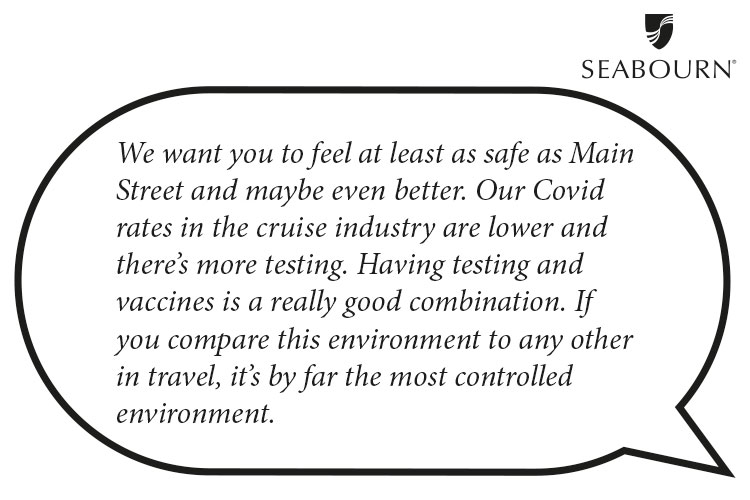
Silversea Cruises
Silversea CEO Roberto Martinoli highlights the importance of following advice from medical experts to make cruise ships a safe environment.
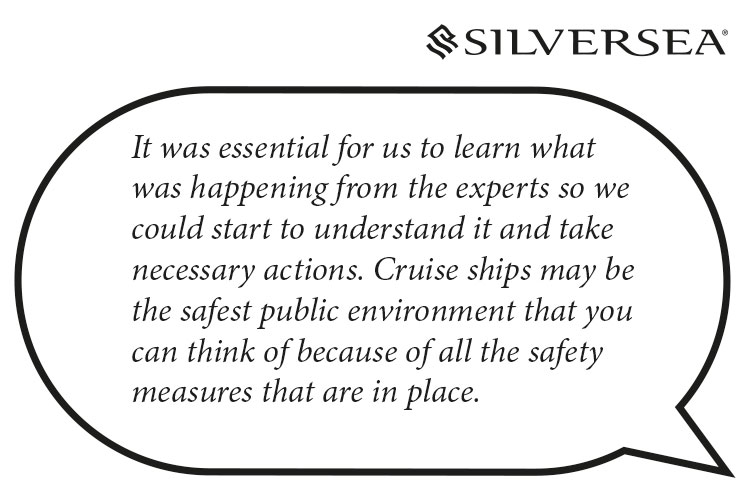
Oceania Cruises
NCLH CEO, Frank Del Rio focuses on the importance of vaccinations and putting health and safety first.
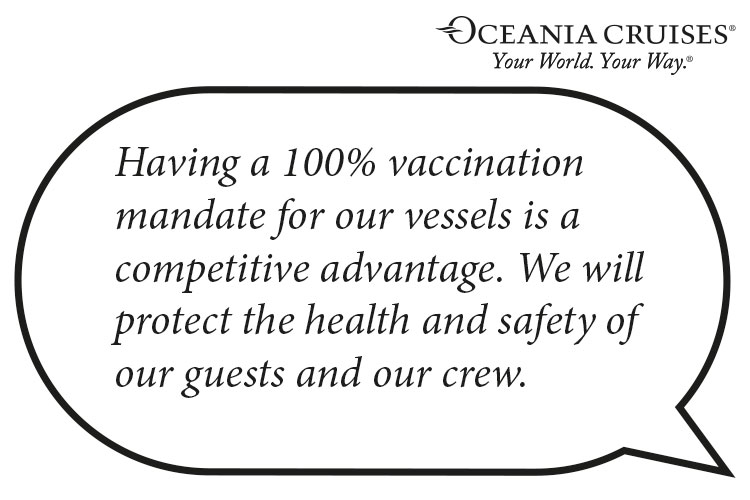
Celebrity Cruises
Celebrity Cruises President and CEO, Lisa Lutoff-Perlo thinks that on a cruise ship is one of the safest places to be, and that the new protocols are working.
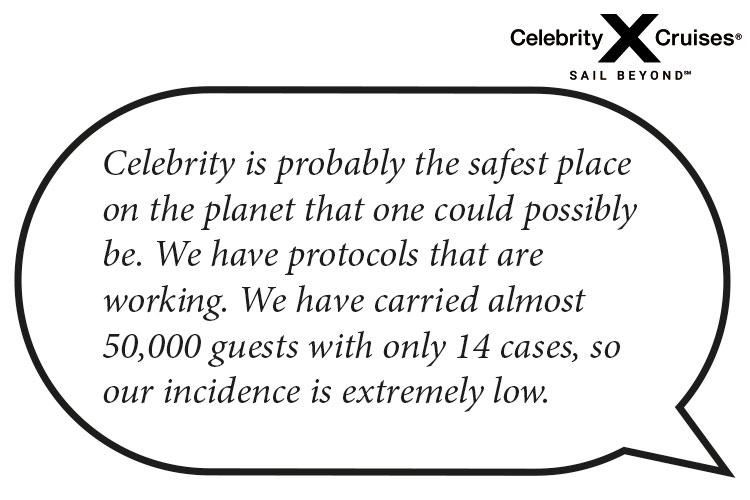
Uniworld River Cruises
CEO and President, Ellen Bettridge points out some of the steps they have taken to ensure a safe return to cruising.
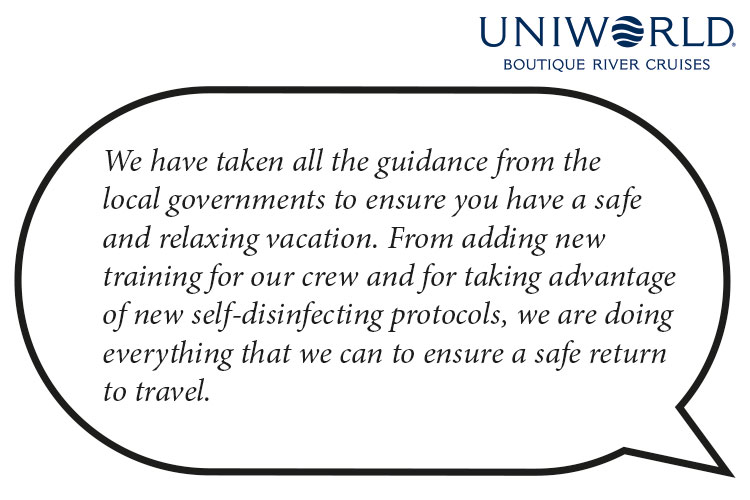
Cruise industry facts from CLIA
Here are 11 facts about things the cruise industry has done to be the safest form of travel. (Source, CLIA)
- The cruise industry has collaborated with global experts, cooperating with national and regional health, transport, and safety authorities to develop world leading health and safety protocols, implementing more than seventy-five science-led measures.
- Ocean-going cruise ships are the only form of travel or passenger transportation that must be medically equipped to care for passengers and crew onboard.
- Cruise ships must have the ability to isolate contagious passengers, and they must have an examination room, an intensive care room and equipment for processing labs, monitoring vital signs, and administering medications.
- Cruise lines help educate cruise passengers on personal health practices, reminding passengers to wash their hands regularly and making hand sanitiser readily available throughout public spaces onboard.
- The cruise industry is one of the most vigilant industries as it relates to sanitation and public health. cruise ships are cleaned and sanitized, under normal circumstances, with a frequency that is nearly unparalleled in other settings. Multiple times each day, cruise ship crews clean and sanitize surfaces known for transmitting germs, such as handrails, door handles, taps and more.
- Cruise industry protocols are unique in their approach to effectively monitor, detect, and respond to potential cases of COVID-19.
- Those protocols encompass the entirety of the cruise experience, incorporating testing, vaccination, screening, sanitation, mask-wearing and other science-backed measures.
- In addition, many cruise lines have announced additional measures in response to the Omicron variant, including strengthening testing, masking, and other requirements, as well as encouraging booster vaccine doses for those eligible.
- Vaccination rates onboard a cruise ship are upwards of 95 percent—significantly higher than the overall UK population, which is currently (as of January 17th, 2022) at around 70% for two doses (76% for one dose, and 53% for three or two plus booster dose).
- Several cruise lines are now requiring, or at least advising guests and crew to have had a booster dose or three doses of covid-19 vaccine by the end of January 2022 to sail (*check your cruise line’s policies for details).
- The latest data shows that, even with higher rates of testing, the cruise industry continues to achieve significantly lower rates of occurrence of COVID-19—33 percent lower than onshore.
A positive look forward from former FDA Commissioner Dr Gottlieb
One of America’s leading public health experts, Dr Scott Gottlieb, former Commissioner of the US Food and Drugs Association, and chair of NCLH SAILSafe programme, gave a special industry talk on his understanding of the covid-19 virus, omicron variant, and how things will move forward from here.
Here are a few of the points he made about the virus:
- Most expert virologists and epidemiologists – including Dr Gottlieb – believe that Omicron will most likely be the last major wave of infection.
- Pandemics have historically lasted between 2-5 years. The last worldwide pandemic was the Spanish flu in 1918. It took longer to spread then as there wasn’t air travel like today to spread it quickly. But there also weren’t the medicines available like we have today to create vaccines to hasten immunity – we are now in the third year of covid-19, so by this pattern, many experts believe that this should be the final year of covid-19.
- Many experts believe that 2022 will see it reach endemic phase, where is becomes a manageable issue, like other pathogens such as like other respiratory viruses in the wintertime, like the common cold. The chance is that the prevalence with this will be less than the flu.
- People are feeling more confident as we’ve gathered a lot of immunity in the population. Harder to envision a strain to gain that breakout potential and pierce that immunity. Omicron and delta are likely to remain the main variant.
- We have protections by achieving more widespread immunity from getting covid-19, and Omicron is a less virulent strain – these two factors intersecting will help.
- Most virologists and epidemiologists believe that there will likely be a very low prevalence of the virus in summer and autumn. This will become more apparent as numbers for cases are reported in the new few weeks.
- To put this into perspective, Dr Gottlieb’s predictions of the Omicron variant rising and falling away does match the UK figures from UK Government Coronavirus data – showing that cases in the UK are now dropping dramatically. The first Omicron case showed in the UK on November 27, when covid-19 cases were 62 per day per 100,000 of the population for the week preceding November 27th.They started rising steeply from December 10th (when they were at 75 per 100,000 population), to the peak of 287 per population on January 4th, 2022. This dropped to 226 January 9th and to 177 on January 11th (the latest information available when this was printed). If it continues at this rate, Omicron should no longer be a major issue by spring.
- Once the virus is at a sufficiently low level, of 10 or less daily cases per 100,000 of the population, life should go back to pre-pandemic “normal”.
- Countries where they have had less access to vaccines, and countries where there has been very little spread of the virus – and therefore little naturally acquired herd immunity – will take a little longer to reach the endemic stage. However, the UK, Europe and North America should reach this stage first.
Here are some points he made about the cruise industry in relation to COVID-19:
- The cruise industry is held to higher standard than other industries, it must report every single case to authorities – this means that there are more headlines about any cases on-board any ship, than there would be if there were any cases in a resort on land.
- The positive side of this means that cruise lines can tightly control their environment – so cruisers can feel safe knowing that everyone on-board – guests and crew – are fully vaccinated, tested before boarding, following all rules on-board. Crew have stricter rules and are tested regularly.
- Cruise lines have therapeutics available on-board and high-quality, PCR quality testing machines on-board.
- If you’re going on another type of holiday, you’re going to be in unknown settings around other people, where you don’t know the steps that are being taken, or if everyone around you has been vaccinated or tested before arriving. On-board cruise ships everyone tested and vaccinated, and guests have access to therapeutics.
- Cruise lines put health and safety first and in much greater focus than almost any other vacation experience you can take.
Dr Gottlieb will be cruising this summer with his wife and children. He has been very cautious throughout the whole pandemic but is very confident that there will be a lower prevalence of cases by spring.
Overall, cruising is the safest form of travel.
Where else can you go knowing that everyone in the same (floating) building as you has taken a covid test before being allowed to enter?
And been double (or triple) vaccinated?
Where else does EVERYONE follow the rules to wear masks?
Where else do people sanitise and wash their hands as often as on a cruise ship?
Where else are all the staff tested as regularly?
And where else has as strict cleaning regimens as standard?
Nowhere.
Nowhere rivals cruise for the dutiful level of care, adherence to, and adding to, government and health industry advised policies to keep their guests and crew as safe as possible on cruise ships.
Start your 2022 on a happy note by calling your Specialist Cruise Concierge or phoning 0808 239 8958 to book your next cruise holiday with SixStarCruises today, feeling safe on-board with the cruise line’s procedures and safe with your booking with our Cruise with Confidence policy.
Happy sailing from all of us at SixStarCruises
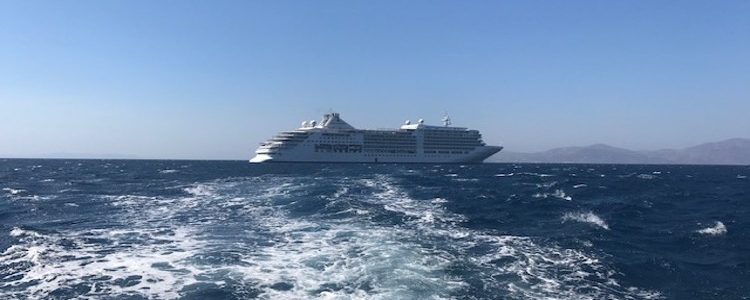

No Comments
Be the first to start a conversation